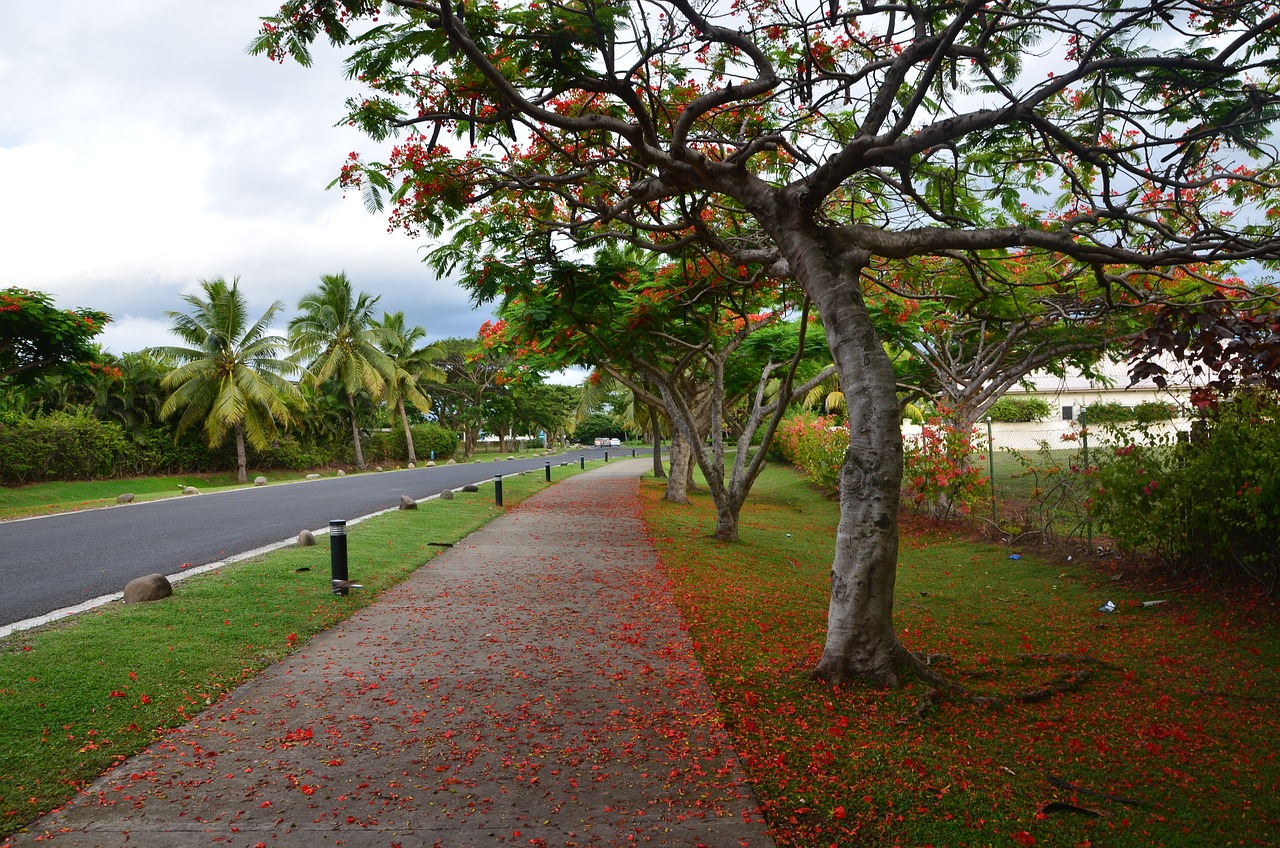Fiji Video
Indulging in Local Cuisine without Breaking the Bank in Fiji
Fiji, known for its stunning beaches and crystal-clear waters, is also a haven for food lovers. The local cuisine in Fiji offers a unique blend of flavors influenced by Indian, Chinese, Polynesian, and European cultures. While dining out in Fiji can be a luxurious experience, it is also possible to indulge in the local cuisine without breaking the bank. In this article, we will explore various ways to enjoy the delicious Fijian food while staying within a budget.
1. Visit Local Markets
One of the best ways to experience the local cuisine in Fiji is by visiting the bustling local markets. These markets offer a wide range of fresh produce, seafood, and spices at affordable prices. You can find a variety of tropical fruits like papayas, pineapples, and bananas, as well as vegetables such as taro, sweet potatoes, and eggplants. The markets also have stalls selling traditional Fijian snacks and street food, allowing you to taste the authentic flavors of Fiji without spending a fortune.
- Fresh Produce: Explore the vibrant stalls filled with colorful fruits and vegetables. Try exotic fruits like rambutan and breadfruit.
- Seafood: Sample the catch of the day, including fish, prawns, and lobster, which are often sold at reasonable prices.
- Traditional Snacks: Don’t miss out on delicious snacks like kokoda (a Fijian ceviche), cassava chips, and fried banana fritters.
- Spices: Purchase local spices like turmeric, curry powder, and masala to add a Fijian twist to your home-cooked meals.
2. Eat at Local Eateries
Instead of dining at high-end restaurants, opt for local eateries to experience the true flavors of Fiji. These small, family-run establishments offer authentic Fijian dishes at affordable prices. You can find traditional favorites such as kokoda, lovo (a Fijian feast cooked in an underground oven), and roti wraps filled with curries and vegetables. By eating at local eateries, you support the local economy and get a taste of the real Fiji.
- Kava Bars: Visit a kava bar, a traditional Fijian gathering place, where you can enjoy a bowl of kava, a traditional Fijian drink made from the kava root.
- Roadside Food Stalls: Look out for roadside food stalls selling delicious snacks like samosas, bhajias, and grilled corn.
- Local Cafes: Try the local cafes for a taste of Fijian-style breakfast, which often includes fresh fruits, coconut bread, and a cup of strong Fijian coffee.
- Food Trucks: Seek out food trucks serving Fijian fusion cuisine, blending traditional flavors with modern twists.
3. Stay in Accommodations with Kitchen Facilities
Another way to indulge in local cuisine without breaking the bank is by staying in accommodations with kitchen facilities. By preparing your meals using fresh local ingredients, you not only save money but also have the freedom to experiment with Fijian recipes. Look for guesthouses, apartments, or vacation rentals that offer fully-equipped kitchens or kitchenettes. This way, you can shop at the local markets and cook your own Fijian feast.
- Guesthouses: Many guesthouses in Fiji provide communal kitchen facilities where you can cook and interact with other travelers.
- Apartments: Renting an apartment gives you the convenience of a private kitchen, allowing you to prepare meals at your own pace.
- Vacation Rentals: Opt for vacation rentals that offer kitchenettes or full kitchens, providing you with the flexibility to cook meals as per your preferences.
4. Embrace Street Food
Street food is an integral part of Fijian culture and a great way to experience local cuisine on a budget. From savory snacks to sweet treats, the streets of Fiji offer a wide variety of flavors. You can find food carts and stalls selling favorites like roti parcels, BBQ skewers, and fresh fruit smoothies. Embrace the vibrant street food scene and savor the delicious flavors of Fiji without emptying your wallet.
- Roti Parcels: Try different fillings, such as chicken curry, vegetable curry, or lentils, wrapped in a flaky roti.
- BBQ Skewers: Sample grilled meats like chicken, pork, or lamb, marinated in flavorful spices.
- Fresh Fruit Smoothies: Cool down with a refreshing smoothie made from tropical fruits like mango, papaya, or passion fruit.
- Sweet Treats: Indulge in traditional Fijian desserts like coconut buns, banana cakes, and cassava puddings.
5. Take Cooking Classes
If you want to learn how to recreate the flavors of Fiji at home, consider taking cooking classes. Many resorts and culinary schools in Fiji offer cooking classes where you can learn traditional Fijian recipes from local chefs. These classes provide hands-on experience in preparing Fijian dishes and give you insights into the local ingredients and cooking techniques. By mastering the art of Fijian cooking, you can bring the taste of Fiji to your own kitchen without spending a fortune.
- Resort Cooking Classes: Join a cooking class organized by resorts, where you can learn to cook Fijian delicacies with a picturesque backdrop.
- Culinary Schools: Enroll in a culinary school that offers specialized courses in Fijian cuisine, providing in-depth knowledge and practical training.
- Local Cooking Workshops: Look out for local cooking workshops organized by community centers or cultural organizations, where you can learn from Fijian home cooks.
6. Explore Food Festivals
Fiji hosts various food festivals throughout the year, celebrating the diverse culinary traditions of the islands. These festivals are a fantastic opportunity to sample a wide range of Fijian dishes at reasonable prices. From seafood festivals to cultural food events, there is always something happening in Fiji for food lovers. Keep an eye out for upcoming food festivals during your visit and immerse yourself in the vibrant food culture of Fiji.
- Hibiscus Festival: Join the annual Hibiscus Festival in Suva, where you can indulge in local delicacies, watch cooking competitions, and enjoy live entertainment.
- Bula Festival: Visit the Bula Festival in Nadi, which showcases Fijian food stalls, cultural performances, and traditional cooking demonstrations.
- Seafood Festivals: Experience the abundance of fresh seafood at the various seafood festivals held across the islands, where you can taste mouthwatering dishes prepared by local chefs.
Fiji Image 1:

7. Opt for Local Drinks
While exploring the local cuisine in Fiji, don’t forget to try the traditional Fijian drinks. Opting for local drinks instead of imported beverages can save you money and give you a taste of the authentic flavors of Fiji. Some popular local drinks include:
- Kava: Join a kava ceremony and try the traditional Fijian drink made from the kava root. It has a mild sedative effect and is an important part of Fijian culture.
- Fresh Coconut Water: Stay hydrated with refreshing coconut water, which is readily available at roadside stalls and markets.
- Tropical Fruit Juices: Quench your thirst with tropical fruit juices made from locally grown fruits like pineapple, mango, and guava.
- Fijian Beer: Enjoy a cold Fijian beer, such as Fiji Bitter or Vonu, which are brewed locally and offer a taste of the islands.
8. Dine in Local Villages
For an authentic Fijian dining experience, consider visiting local villages and participating in a traditional Fijian feast. Many villages offer village tours and cultural experiences that include a communal meal with traditional dishes. These meals are usually prepared using locally sourced ingredients and cooked in traditional earth ovens. By dining in local villages, not only do you get to enjoy a delicious meal, but you also contribute to the local community.
- Village Tours: Join guided village tours that include a visit to a local family’s home, where you can enjoy a home-cooked meal and learn about Fijian traditions.
- Traditional Lovo: Experience a traditional Fijian feast known as “lovo,” where food is cooked underground in an earth oven, resulting in tender and flavorful dishes.
- Participate in Kava Ceremonies: Engage in a kava ceremony, where you can bond with the locals over a bowl of kava and gain insights into Fijian customs and traditions.
Fiji Image 2:

9. Seek Out Local Specialties
To truly immerse yourself in the local cuisine of Fiji, seek out the regional specialties that each area has to offer. From seafood delicacies to unique desserts, every region in Fiji has its own culinary treasures waiting to be discovered. Here are some local specialties to look out for:
- Kokoda: Try this popular Fijian dish made from raw fish marinated in lime juice and coconut milk, mixed with onions, chili, and tomatoes.
- Rourou Soup: Sample this traditional Fijian soup made from taro leaves, coconut cream, onions, and spices.
- Palusami: Indulge in palusami, a dish made from taro leaves filled with seasoned coconut cream, wrapped in banana leaves, and cooked until tender.
- Dalo Chips: Taste the crispy dalo chips, which are thinly sliced taro roots deep-fried until golden brown and sprinkled with salt.
10. Enjoy Beachside Barbecues
When in Fiji, make the most of the stunning beaches and enjoy beachside barbecues. Many resorts and guesthouses offer beachside barbecue facilities where you can grill your own seafood or meat while enjoying the beautiful surroundings. This is a fantastic way to savor the flavors of Fiji in a relaxed and picturesque setting.
- Resort Barbecues: Check if your resort offers beachside barbecue facilities. Buy fresh seafood or meat from local markets and enjoy a barbecue feast with a view.
- Beach Picnics: Pack a picnic basket with local delicacies and head to a secluded beach for a memorable dining experience.
- Public Barbecue Areas: Some public beaches have designated barbecue areas where you can grill your own food. Just remember to clean up afterward.
Fiji Image 3:

11. Stay Hydrated with Tap Water
To save money on drinks during your stay in Fiji, consider drinking tap water. Fiji has a reliable supply of clean and safe tap water, so there is no need to purchase bottled water. Carry a reusable water bottle and refill it from taps or ask your accommodation if they provide filtered water. This way, you can stay hydrated without spending extra money on bottled beverages.
12. Budget-Friendly Dining Tips
Here are some additional budget-friendly dining tips to help you enjoy the local cuisine without breaking the bank in Fiji:
- Share Meals: Portions in Fiji are often generous, so consider sharing meals with your travel companions to save money and reduce food waste.
- Ask Locals: Strike up conversations with locals and ask for their recommendations on affordable places to eat. They can provide valuable insights into hidden gems.
- Takeaway Options: If you’re on a tight budget, opt for takeaway meals from local eateries or markets. This allows you to enjoy Fijian food at a lower cost.
- Happy Hour Deals: Take advantage of happy hour deals at bars and resorts to enjoy discounted drinks and snacks.
- Plan Picnics: Pack a picnic with fresh produce and snacks from the local markets. Enjoy your meal in a park or on the beach, surrounded by the beauty of Fiji.
Conclusion
Indulging in the local cuisine in Fiji doesn’t have to break the bank. By visiting local markets, eating at local eateries, staying in accommodations with kitchen facilities, embracing street food, taking cooking classes, exploring food festivals, and seeking out local specialties, you can experience the authentic flavors of Fiji without overspending. Remember to stay hydrated with tap water and follow these budget-friendly dining tips to make the most of your culinary journey in Fiji.
References
– Tourism Fiji: www.fiji.travel
– Fiji Guide: www.fijiguide.com
– Fiji Times: www.fijitimes.com


